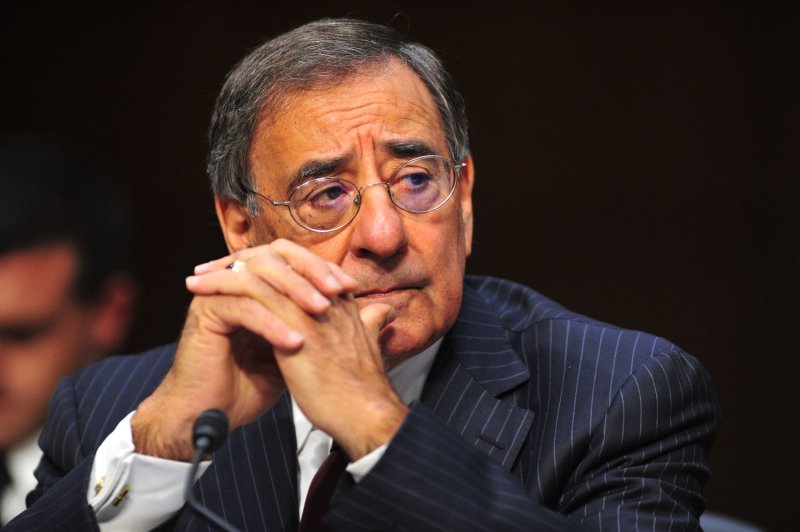1 of 3 | Defense Secretary Leon Panetta testifies during a Senate Armed Services Committee hearing on security issues relating to Iraq in Washington on November 15, 2011. Panetta reportedly plans to cut the size of the U.S. Army by 14 percent. UPI/Kevin Dietsch |
License Photo
ARLINGTON, Va., Jan. 5 (UPI) -- President Obama and U.S. Defense Department leaders Thursday unveiled a new strategy they said would prepare the military for 21st century challenges.
The Defense Strategic Review, while short on specifics in advance of Obama's budget proposals in a few weeks, seeks to enact more than $400 billion in Pentagon budget cuts and reductions in force for the next decade.
"As we look beyond the wars in Iraq and Afghanistan and the end of long-term, nation-building with large military footprints, we'll be able to ensure our security with smaller conventional ground forces," Obama said in a briefing at the Pentagon -- a first for any president -- in which the new strategy was outlined.
While the U.S. military will be "leaner," the global community must know the United states will "maintain our military superiority with armed forces that are agile, flexible and ready for the full range of contingencies and threats," Obama said.
Successes of the past -- including the withdrawal of U.S. troops from Iraq, the beginning of a transition phase in Afghanistan and the death of al-Qaida founder Osama bin Laden -- brought the country "to a moment of transition," Obama said. "The tide of war is receding."
The strategy helps to answer the question, "What kind of military will we need long after the wars of the past decade are over?" Obama said.
While the United States has the opportunity and responsibility for the military force needed in the future, leaders also must recognize the need to renew "the economic strength at home," Obama said.
Obama said the strategy includes strengthening military presence in the Asia-Pacific and the Middle East, ensuring the troops have the equipment to succeed and are assisted once they return home and tackling the Pentagon budget.
Obama said he was certain some would complain the spending reductions are too large while others would say the cuts didn't go far enough once his budget plan is released.
"It will be easy to take issue with a particular change in a particular program," Obama said, suggesting that the proposals must be weighed against the broader goal of maintaining balance in and among national programs.
"Over the next 10 years, the growth in the defense budget will slow … [but it] will still grow, because we have global responsibilities that demand our leadership," Obama said. "In fact, the defense budget will still be larger than it was toward the end of the [George W.] Bush administration. And I firmly believe … that we can keep our military strong and our nation secure with a defense budget that continues to be larger than roughly the next 10 countries combined."
Defense Secretary Leon Panetta said four principles guided discussions on developing the strategy: Maintaining the finest military in the world, preserving the quality of the all-volunteer force; avoiding hollowing out cuts arbitrarily and achieving savings in a balanced manner with "everything on the table including politically sensitive areas."
Published reports indicate Panetta wants the U.S. Army to shrink to 490,000 soldiers from 570,000 soldiers.
The U.S. force of the future "will be smaller and it will be leaner," Panetta said, but it will be more agile, flexible, innovative, technically advanced and able to deploy more quickly.
The Pentagon "would need to make a strategic shift regardless of the nation's fiscal situation," he said. "The fiscal crisis has forced us to face the shift."
He also asked lawmakers to hit target reductions agreed to during negotiations between Congress and the White House over raising the debt ceiling last summer. If the target reduction isn't reached, the Defense Department would be subject to across-the-board cuts of between $500 billion and $600 billion that Panetta said "would result would be a demoralized and hollow force."
Gen. Martin Dempsey, chairman of the Joint Chiefs of Staff, said the agreement "sustains the sacred trust put in us by the American people to defend them and this country."
He said the plan called for innovation and expansion and that the envisioned military "will always provide security and do more than one thing at a time."
The strategy does have risks that would be measured in time and capacity, Dempsey said.
"We can face even greater risks if we did not change," Dempsey said.















